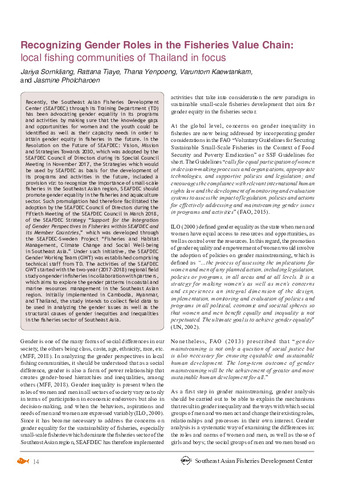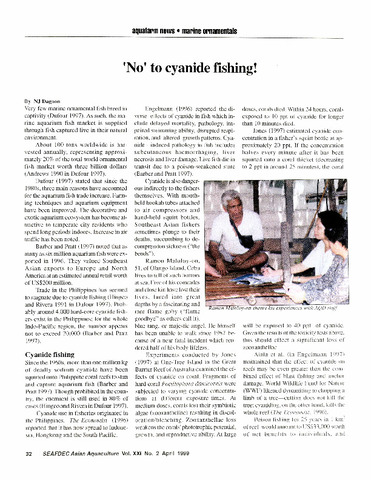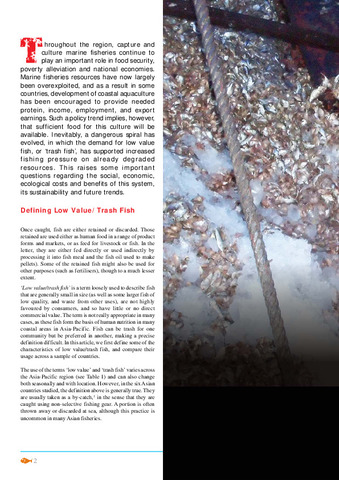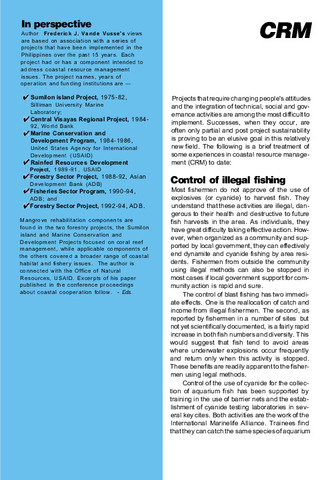Recognizing gender roles in the fisheries value chain: Local fishing communities of Thailand in focus

Tingnan/
Downloads: 1,404
Petsa
2018May-akda
Page views
1,705Metadata
Ipakita ang buong tala ng item
Share
Abstract
Recently, the Southeast Asian Fisheries Development Center (SEAFDEC) through its Training Department (TD) has been advocating gender equality in its programs and activities by making sure that the knowledge gaps and opportunities for women and the youth could be identified as well as their capacity needs in order to attain gender equity in fisheries in the future. In theResolution on the Future of SEAFDEC: Vision, Mission and Strategies Towards 2030, which was adopted by the SEAFDEC Council of Directors during its Special Council Meeting in November 2017, the Strategies which would be used by SEAFDEC as basis for the development of its programs and activities in the future, included a provision viz: to recognize the importance of small-scale fisheries in the Southeast Asian region, SEAFDEC should promote gender equality in the fisheries and aquaculturesector. Such promulgation had therefore facilitated the adoption by the SEAFDEC Council of Directors during the Fiftieth Meeting of the SEAFDEC Council in March 2018, of the SEAFDEC Strategy “Support for the Integration of Gender Perspectives in Fisheries within SEAFDEC and its Member Countries,” which was developed through the SEAFDEC-Sweden Project “Fisheries and Habitat Management, Climate Change and Social Well-being in Southeast Asia.” Under such initiative, the SEAFDEC Gender Working Team (GWT) was established comprising technical staff from TD. The activities of the SEAFDECGWT started with the two-year (2017-2018) regional field study on gender in fisheries in collaboration with partners, which aims to explore the gender patterns in coastal and marine resources management in the Southeast Asian region. Initially implemented in Cambodia, Myanmar, and Thailand, the study intends to collect field data to be used in analyzing the gender issues as well as the structural causes of gender inequities and inequalities in the fisheries sector of Southeast Asia.
Suggested Citation
Sornkliang, J., Tiaye, R., Yenpoeng, T., Kaewtankam, V., & Pholcharoen, J. (2018). Recognizing gender roles in the fisheries value chain: Local fishing communities of Thailand in focus. Fish for the People , 16(2), 14-19. http://hdl.handle.net/20.500.12066/1378
Paksa
Mga koleksyon
Related items
Showing items related by title, author, creator and subject.
-
'No' to cyanide fishing!
Dagoon, N. J. (Aquaculture Department, Southeast Asian Fisheries Development Center, 1999) -
Prized commodity: Low value/trash fish from marine fisheries in the Asia-pacific region
Staples, Derek; Funge-Smith, Simon (Secretariat, Southeast Asian Fisheries Development Center, 2005)The use of the terms 'low value' and 'trash fish' varies across the Asia-Pacific region and can also change both seasonally and with location. This article defines low value/trash fish as 'Fish that have a low commercial ... -
CRM in the Philippines: Lessons learned
Southeast Asian Fisheries Development Center, Aquaculture Department (Aquaculture Department, Southeast Asian Fisheries Development Center, 1996)Philippine coastal communities can become capable fishery resource managers and that their management practices can become largely self-sustaining if the project approach focuses on assisting fishermen to learn how to help ...




